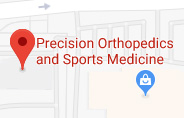MRI
MRI Stands for Magnetic Resonance Imaging. MRI is a way of getting pictures of various parts of your body without the use of X-rays. Unlike X-rays and computed tomographic (CT) scans, which use radiation, a MRI uses powerful magnets and radio waves. A radio wave antenna is used to send signals to the body and then receive signals back.
These returning signals are converted into pictures by a computer attached to the scanner. Pictures of almost any part of your body can be obtained at almost any particular angle.
MRI is quite safe in the majority of patients. Certain patients may not be able to have an MRI. These include people who get nervous in small spaces (claustrophobic) and those with implanted medical devices such as aneurysm clips in the brain, heart pacemakers and cochlear (inner ear) implants.
Also, people with pieces of metal close to or in an important organ (such as the eye) may not be scanned. There are a few additional safety considerations and some exceptions based on individual circumstances.
This test may be used to diagnose or evaluate:
- Abnormal growths and tumors
- Blood flow
- Blood vessels
- Lymph nodes
- Organ function
Combining MRIs with other imaging methods can often help the doctor make a more definitive diagnosis. MRI images taken after a special dye (contrast) is delivered into the body may provide additional information about the blood vessels. An abdominal MRI provides detailed pictures of the belly area from many different views.
It is often used to clarify findings from previous X-rays or CT scans. A pad is placed on the patient’s abdomen to help make the pictures clearer. MRI can distinguish tumors from normal tissues and can help the doctor determine the tumor’s size, severity, and spread. This is called staging.
Advantages & Dis-Advantages
Advantages of MRI include diagnosing:
- Strokes in their earliest stages
- Brain and pituitary tumors
- Spine, or joint infections
- Visualizing torn ligaments in the wrist, knee, and ankle
- Visualizing shoulder injuries
- Herniated discs in the spine
MRI also has disadvantages. These include:
- People with pacemakers cannot have MRIs.
- Patients who are morbidly obese may not fit into an MRI system.
- Claustrophobic patients often cannot make it through a MRI.
- These patients may require sedatives or an Open MRI which is an MRI system that is not completely closed around the patient.
- The MRI machine makes a tremendous amount of noise during a scan. The noise sounds like a continual, rapid hammering. The noise is due to the rising electrical current in the wires of the gradient magnets being opposed by the main magnetic field. The stronger the main field, the louder the gradient noise. Patients are given earplugs or stereo headphones to muffle the noise.
- MRI scans require patients to hold still for extended periods of time. MRI exams can range in length from 20 minutes to 90 minutes or more.
- MRI systems are very expensive. Therefore the exams are also very expensive.
- Lastly, people with kidney disease, dialysis patients, or people who didn’t know they had kidney disease are at high risk to develop an incurable condition called Nephrogenic Systemic Fibrosis (NSF) from the MRI dye injection gadolinium. NSF causes a hardening or stiffening of the skin and joints.
Preparation for MRI Test
Before your MRI test, tell your health professional and the MRI technologist if you:
- Are allergic to any medicines.
- If you are or might be pregnant.
- If you wear any jewelry, eyeglasses, hearing aids, hairpins, removable dental work or other objects that may interfere with the procedure.
- Have any other health conditions, such as kidney problems that may prevent you from having an MRI using contrast material.
- Had recent surgery on a blood vessel. In some cases you may not be able to have the MRI test.
- Wear any medication patches. The MRI may cause a burn at the patch site.
- For an MRI of the abdomen, you may be asked not to eat or drink for several hours before the test.
2120 N. MacArthur Blvd
Suite 100
Irving, TX 75061
 Ph: (972) 438 4636
Ph: (972) 438 4636
 Fax:
(972) 438 2077
Fax:
(972) 438 2077

 Make an Appointment Online
Make an Appointment Online

 Shoulder
Shoulder Elbow
Elbow Wrist
Wrist Hand
Hand Patient Education
Patient Education Testimonials
Testimonials Map
& Location
Map
& Location Patient Forms
Patient Forms






